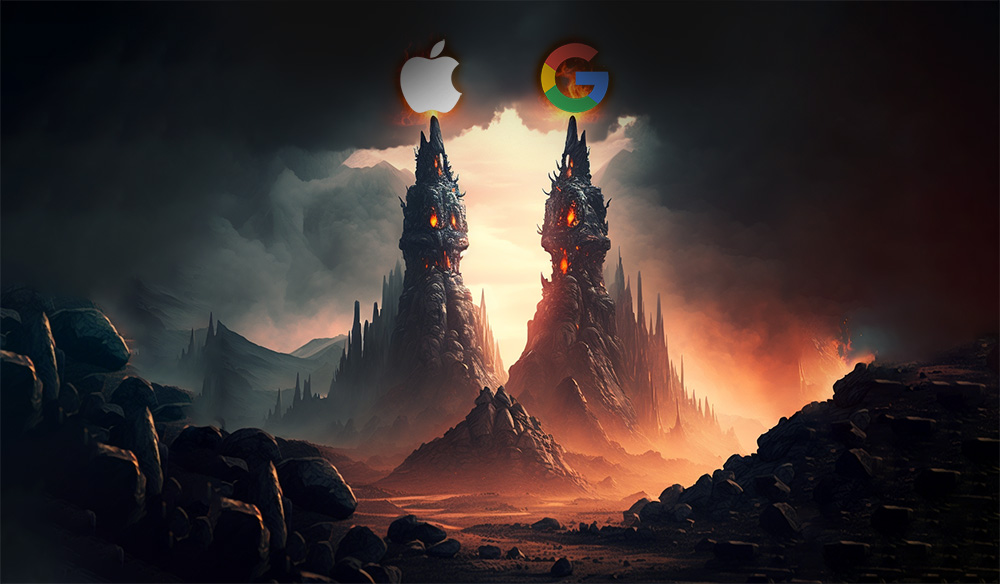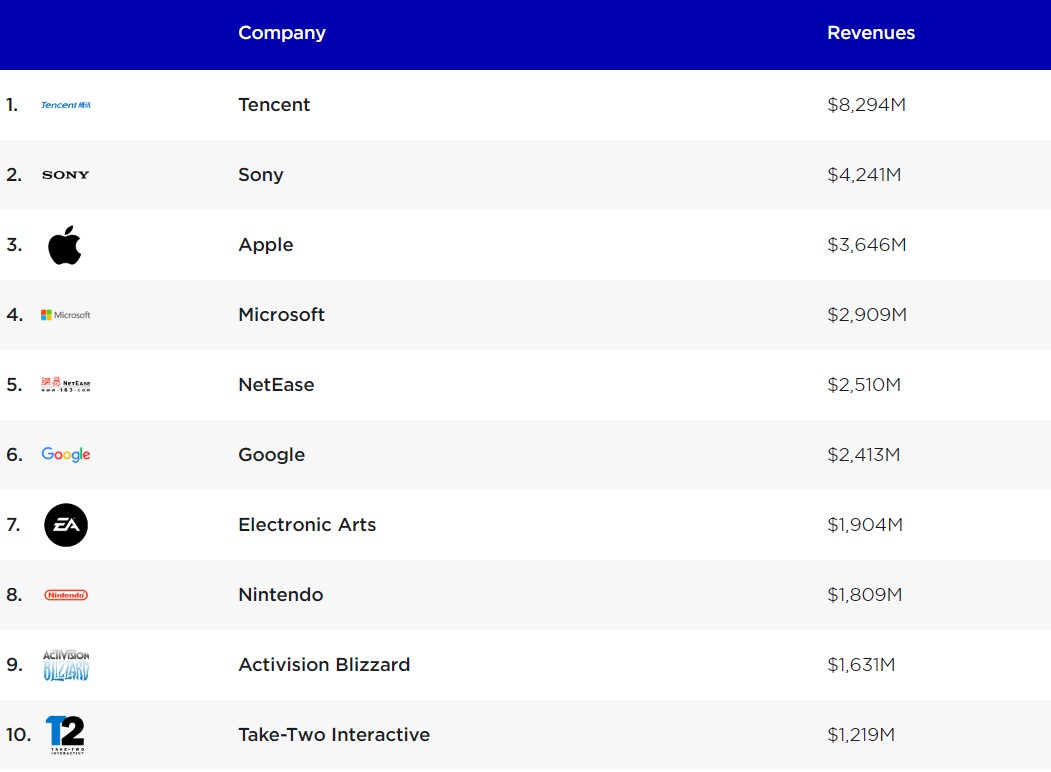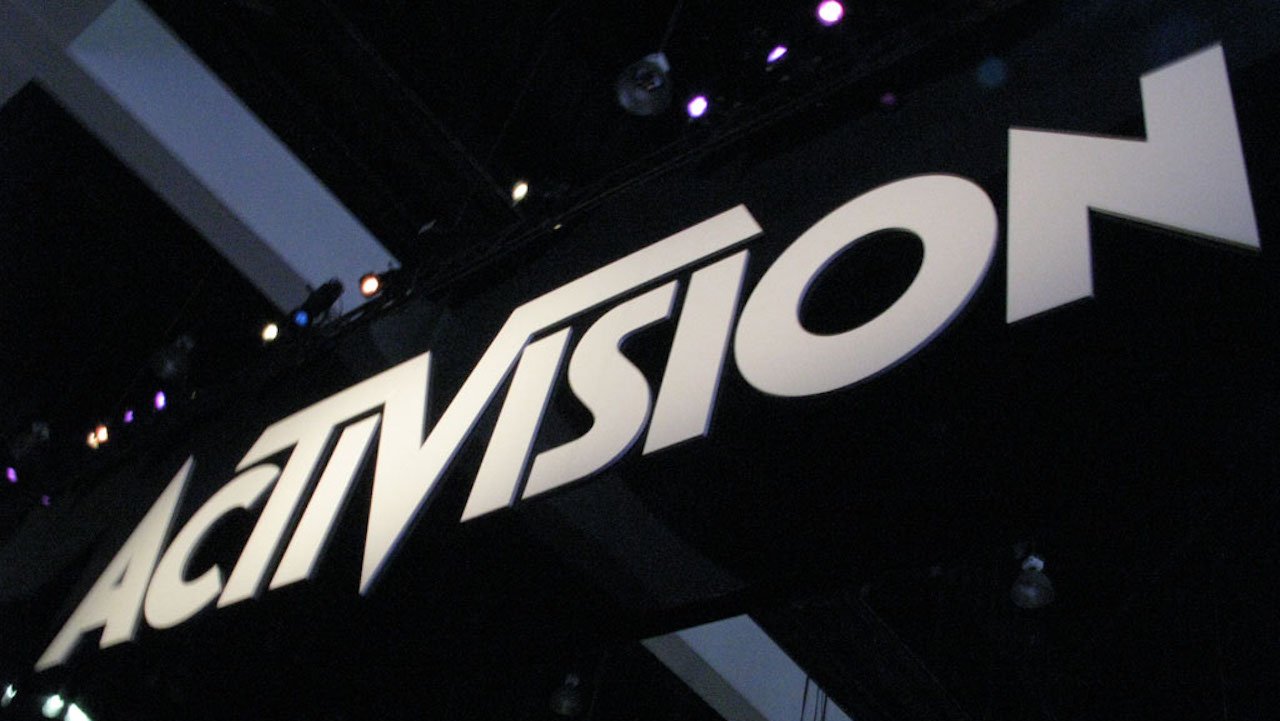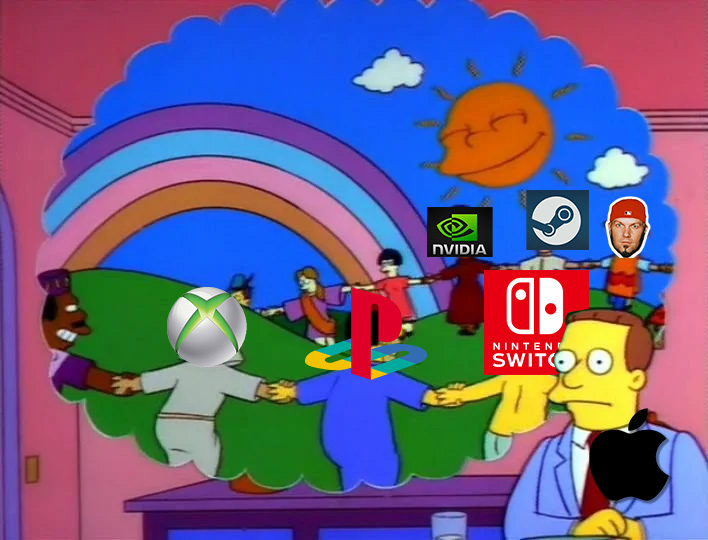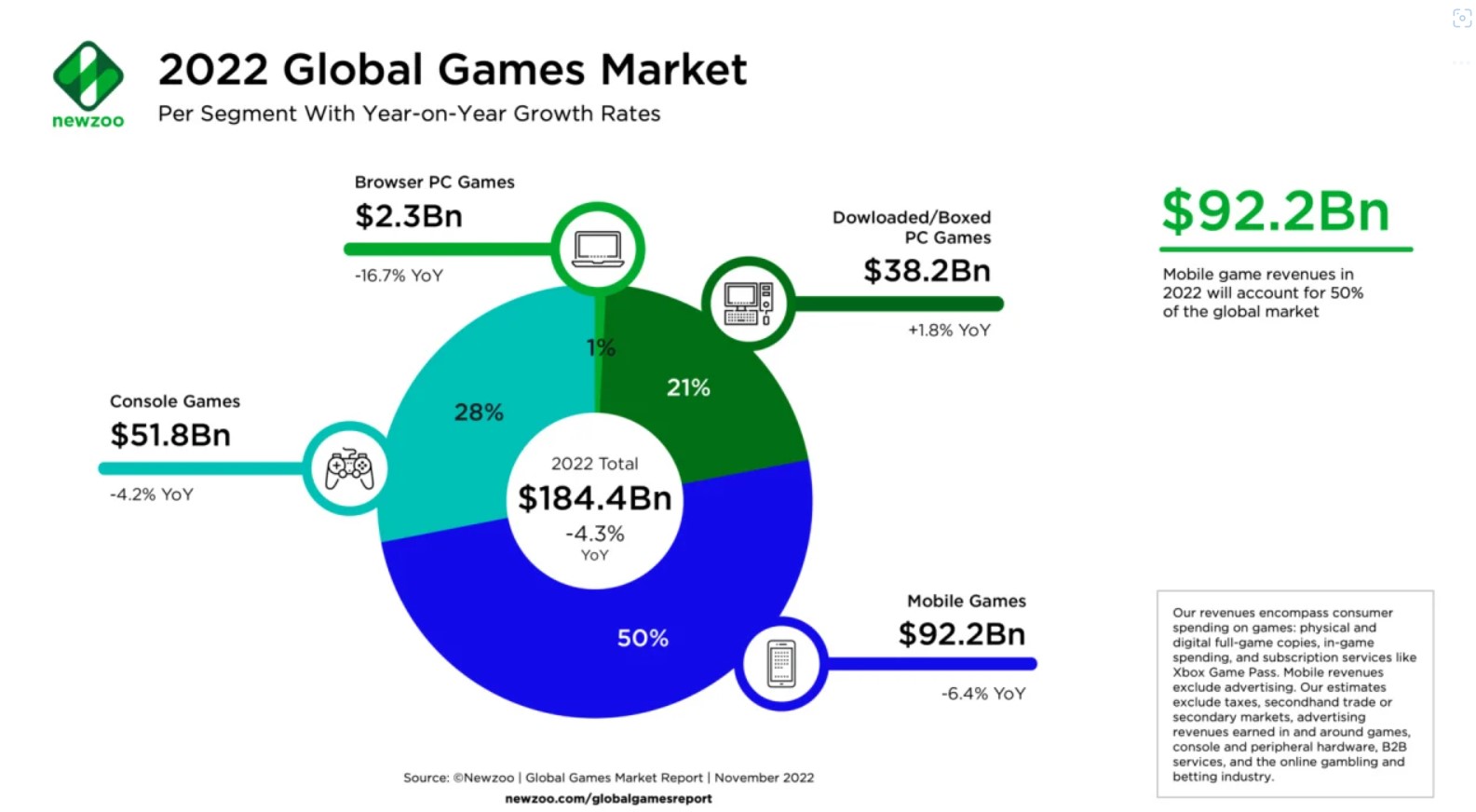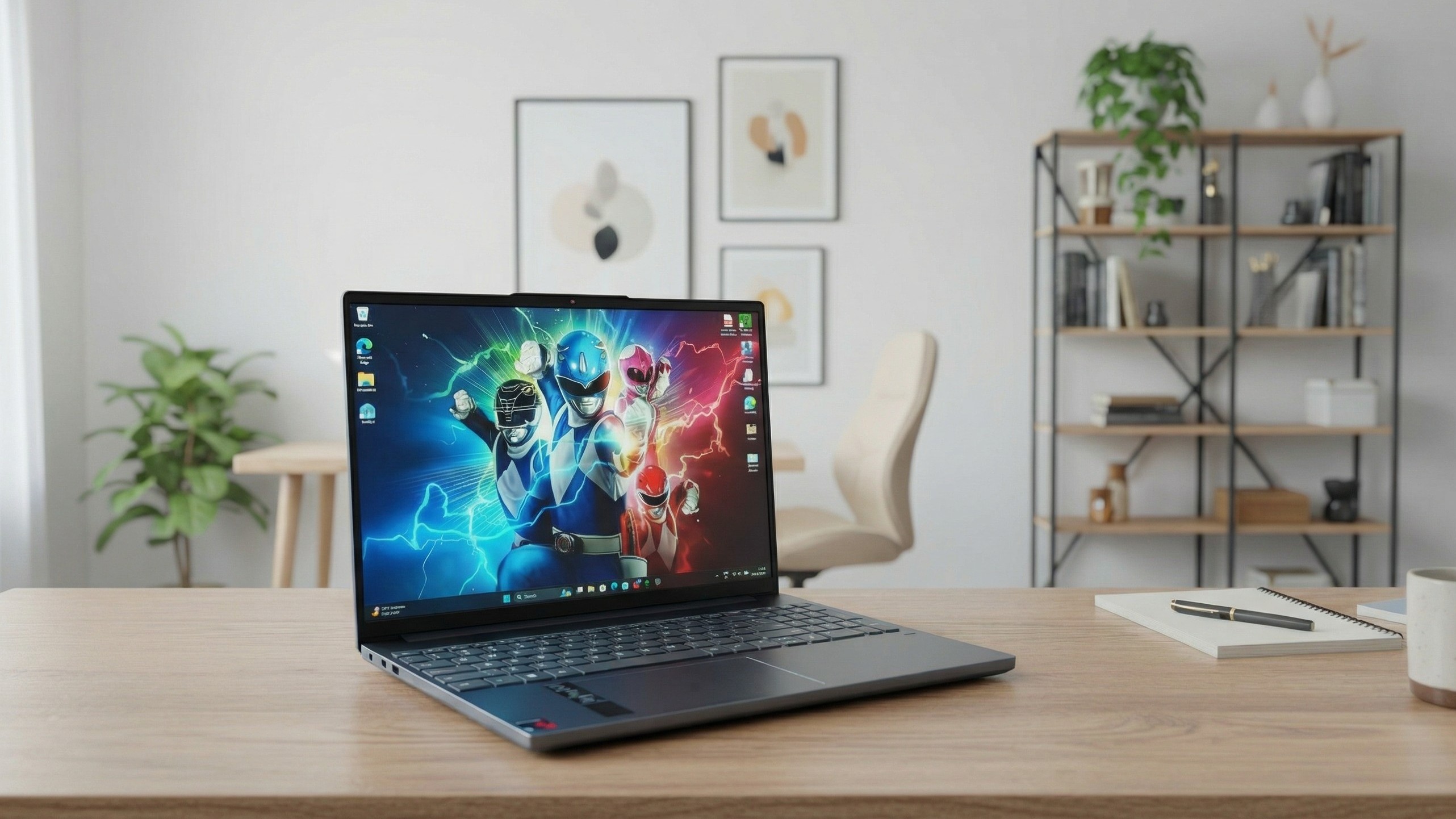For gaming's future, PlayStation and Xbox need to stop squabbling and focus on the real enemy
The real enemy has stayed quiet through all of this.
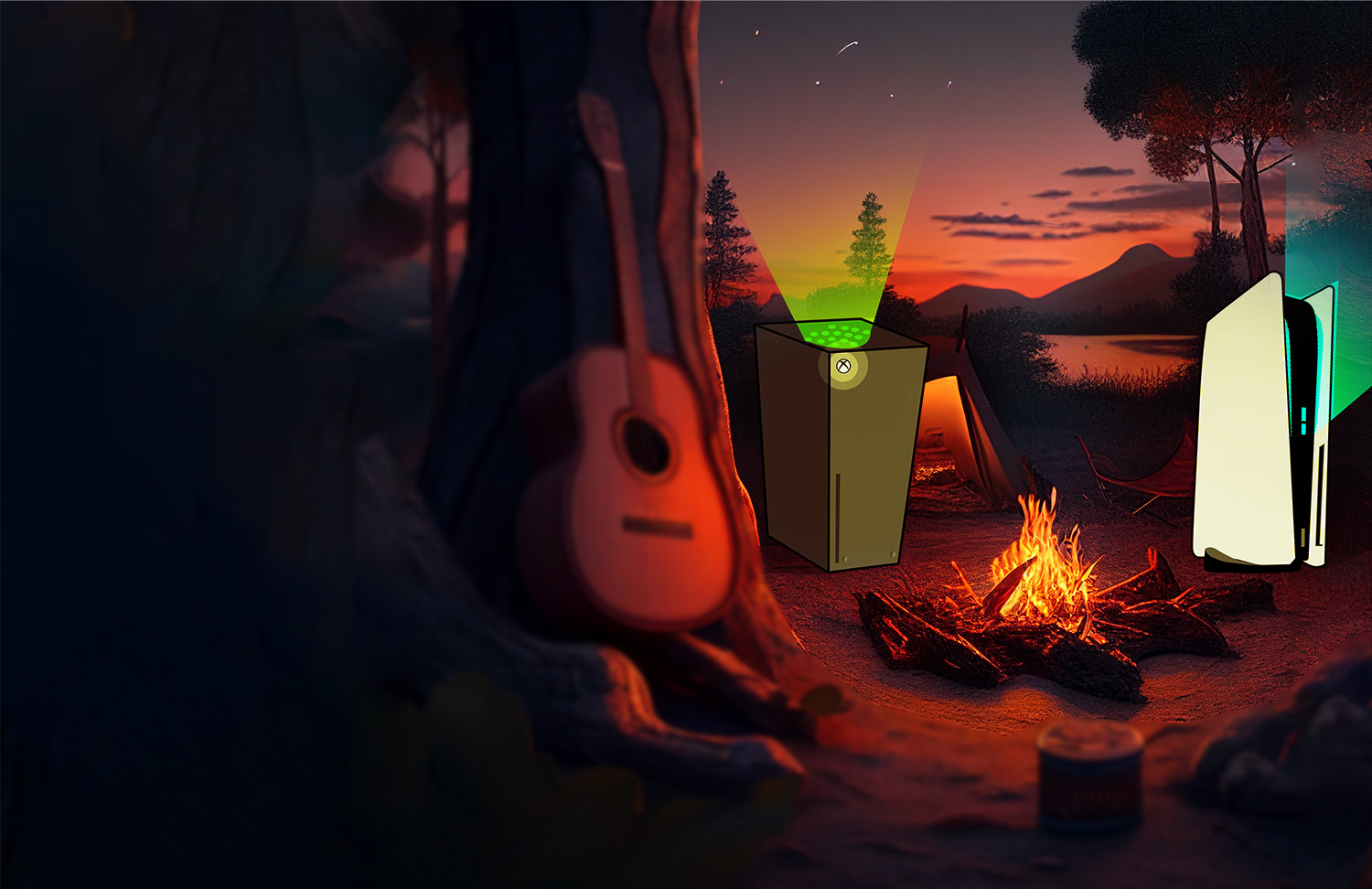
All the latest news, reviews, and guides for Windows and Xbox diehards.
You are now subscribed
Your newsletter sign-up was successful
Another week, another load of Activision Blizzard King drama.
Activision-Blizzard-King (ABK) is currently in the process of merging with Microsoft, granting Xbox control over Call of Duty, Candy Crush, and World of Warcraft — amongst others. This past week, we were over in Belgium to hear first-hand from Microsoft President Brad Smith how Xbox will offer up all of its games on competing services like NVIDIA GeForce Now and Nintendo Switch, as proof that it isn't about hurting competition in the gaming space.
There are a couple of companies that Smith didn't talk about, though.
For years, I've been writing about how Microsoft isn't really trying to compete against Sony or Nintendo in the wider gaming macrocosm. Indeed, Microsoft continues to offer games like Minecraft on PlayStation, which would undoubtedly become a system seller on Xbox if it was somehow no longer in parity with competing versions. I also said from day one, that Call of Duty would remain multiplatform on the simple basis that it's obvious to me as a Microsoft analyst where the company's headspace is. Of course, Microsoft still wants to remain a competitive option in the console market, but its plans are grander than what is essentially a constrained segment.
While the combined console industry has a few hundred million gamers, the combined mobile industry has a couple of billion — and it's growing at a much faster cadence than other segments. Furthermore, youngsters are growing up with iPads and are expecting their games to be free, rammed with ads, and come with pay-to-win mechanics. It's a cultural phenomenon born of the fact that mobile platform holders quite aggressively do not care about gaming — only money. Predating on our psychological weaknesses is par for the course on mobile, to the detriment of core gaming.
If indeed there is a desire to preserve traditional gaming for future generations, there's a unique opportunity here. It revolves around platform holders like Sony, Microsoft, Nintendo, and even new players like GeForce Now, to effectively join forces and peel open the closed and anti-gaming nature of iOS and Android.
Moving ABK to a platform holder like Microsoft is going to bring serious clout to that argument, given that right now, every platform holder is effectively locked out of growing on mobile devices. And for Apple and Google, that is by design.
All the latest news, reviews, and guides for Windows and Xbox diehards.
Apple and Google don't care about gamers, but they increasingly dictate the course of the industry
This past week, an interesting piece of drama exploded in a smaller corner of the net that many console gamers probably aren't even aware of.
Legendary mobile publisher Rovio upset fans of its popular Angry Birds franchise, while also sparking a debate about the problematic functionality of mobile gaming. Rovio announced that it would be removing the classic, buy-to-play Angry Birds from mobile platforms, because it's "harming" their other games. Reading between the lines here: Apple and Google's policies on mobile platforms make it so the only viable way to do business on phones is to ram your games with ads, microtransactions, and predatory functionality to spark addictive synapses. The classic Angry Birds is very much in the vein of a classic console game: you buy it, you own it, and can play it forever. More modern Angry Birds games are, of course, shaped in the fires of Apple's anti-innovation price gouging landscape, which demands developers pay exorbitant fees for the privilege of existing izn its de-facto monopoly.
Indeed, friends. The real enemy of console gaming isn't the opposing plastic box, sold at cost, often at a loss. The real enemies of core console and PC gaming are the Apples and Googles (now Alphabet) of the world, whose algorithmic approach to curation on their storefronts often promotes games-as-manipulation, rather than games-for-fun. Time-gating for ads, pay-for-power, and other mechanics are designed to trick users into giving Apple and Google infinite cash, rather than a good time, while gouging developers in the process with heavy fees for visibility. The lack of standards on mobile makes user acquisition an expensive pay-to-play system that consolidates the platform around a handful of mega publishers, where viral hits the likes of which we see emerge on Steam or consoles become a rarity.
It ultimately boils down to a philosophical discussion, as gaming is an intersection between entertainment, art, business, and technology. The problem for traditional companies like Microsoft, Sony, and Nintendo, is that not only do Apple and Google not care about traditional gaming, traditional gaming is full-bore in opposition to their business models. As a duopoly, their mobile storefront practices have been felt quite cataclysmically at times in the console industry. The reason why Overwatch 1 was removed and replaced with a free-to-play battle pass-o-rama is ultimately the same reason why Rovio is removing Angry Birds. Mobile gaming didn't quite kill traditional gaming as some predicted in the early days. However, Apple and Google opened a Pandora's Box with their lack of interest in curating healthy gaming experiences, and it's seeping into the console space, whether we like it or not.
A few weeks ago, we had something of a "service game apocalypse" where various titles were shuttered. Rumbleverse, Apex Legends Mobile, CrossFire X, and various others were killed off at the start of the quarter, as publishers look to cut costs as the economy realigns itself in the post-pandemic era. In some ways, the pandemic accelerated industry trends in ways that are concerning if you're a fan of console gaming. It's really only the big three, namely PlayStation, Nintendo, and Xbox that are able to keep making games that are actually games and not casinos masquerading as games. Still, their ability to do so is clearly being impeded by encroachment from Apple and Google's insistence that games should be casinos, and by giants like Tencent and NetEase who astutely capitalized on that opportunity.
Sure, you can buy fully-priced titles on phones, Apple even has its own very pedestrian "Apple Arcade" subscription service with some higher-quality traditional-style games. But the curation skews heavily towards the kinds of games that are operating more akin to slot machines, eschewing the practices that provide healthy, high-quality experiences many of us want to play, and many developers, actually want to build. Apple and Google rarely surface these types of games, because they know there's more money to be made by sending you into a freemium manipul-a-thon instead, and their mobile publishing partners are happy to keep offering these kinds of "games" at a breakneck pace.
And to be clear: my philosophy is that there's nothing wrong with adults choosing to spend money however they want to spend it. And there's nothing wrong with companies building games that are within the law, even if they have some debatable ethics. Console developers have stepped carefully around building some of these kinds of mechanics into traditional games. A Sea of Thieves or Fortnite battle pass looks a lot different from a Diablo Immortal battle pass, for example. We famously saw EA overstep with Battlefront II, with its pay-to-win cards system. Console gamers fought back, and for now, we have generally beaten them back to cosmetic-only business models that don't encroach on player power. Every game publisher knows that "pay-to-win" models are far more lucrative, and nobody knows this as much as Apple and Google.
But as I said earlier, it's a philosophical discussion. Pay-to-win creates a two-tier gaming landscape where poorer players are punished for being poorer, and richer players are rewarded for being richer. Whether or not that's "fine" will boil down to your personal values, herein I am merely presenting my view. Even if you're fine with that, I think competition is healthy. The pendulum is swinging harder and harder toward these types of problematic mechanics and business models, that increasingly exclude people based on their income.
Presuming Sony, Microsoft, and Nintendo are philosophically opposed to that kind of gaming landscape, the Activision deal is a chance to fight back against this type of curation. It would offer an alternative — competition — to what Apple and Google would prefer gaming to look like. And it only works if those platform holders work together.
The Activision deal is about changing the course of mobile gaming, and has little to nothing to do with the 'console war'
Microsoft has stated its previous intent to build a mobile gaming store of its own, although it has offered no real details on how it might achieve this. In the case of Apple, it's simply not possible to offer a competing store on iOS, because it's completely closed down. In the case of Android, you can offer alternative Android stores, but it's not exactly easy to do. Samsung has its own Android store, for example, but Google's own Play Store is the default option on all Android devices by policy. I would guess many Samsung phone users don't even know the Samsung Galaxy store exists, and it's a shame — because it is quite awesome, and presents a framework for a healthier mobile gaming web.
The Samsung Galaxy Store is quite telling. It's the only place you can play Fortnite on Android, for example, after Google Play blocked Epic for the crime of offering its own payment service. The Xbox Game Pass app from the Galaxy Store also has more features than Xbox Game Pass from Google Play, namely that in-game purchases and DLC actually works. Google Play doesn't allow publishers and developers of any size to sell DLC and in-app purchases without having an explicit store listing on Google Play — whereas Samsung does. And iOS? Forget it. Apple exerts complete and total control over who and what can publish content on their phones, taking an absolutely whopping 30% cut for the privilege.
Sony, Microsoft, and Nintendo also levy a beefy cut for content hitting their respective platforms. The traditional console platforms also sell their hardware at cost, though, unlike Apple, which enjoys industry-leading margins for its hardware. Google's business also revolves around ads, more so than direct game purchases. They'd rather have a legion of games that time gate you in exchange for watching an ad or spending money, rather than buy-once ad-free titles that we expect to get on traditional platforms.
Sony has created an argument that revolves around Call of Duty on consoles, to its detriment. From day zero, Microsoft has attempted to commit to the fact that Call of Duty will remain multiplatform. Microsoft has attempted to explain that this deal was ultimately about mobility. Yet, the prevailing media narrative maintains its focus on the big manufactured controversy, rather than the games industry as it exists as a whole. The entire industry does not revolve around a single franchise, and if the console business revolves around access to a single franchise, it would be an indictment of how fragile it is. Things simply aren't that dire — but they could be, and it won't be because of Call of Duty.
Microsoft has responded to these apparent concerns by offering Call of Duty on a legally-binding, ten-year contractual basis, which would obviously continue beyond ten years much like access to the Minecraft franchise has. Nobody with even a basic understanding of the video game industry expects Microsoft to curtail access to Call of Duty on other platforms, at least not in good faith. I also doubt that Microsoft will use its influence over Call of Duty to create better outcomes for itself while dealing with Sony for titles like Minecraft, Minecraft Dungeons, Legends, and so on. It's fair to expect they might though, and regulators, Sony, and Microsoft should work on remedying that with legally-binding contracts.
Having access to Activision's portfolio is ultimately about influencing the direction the video game industry will go in, maintaining the traditions we enjoy, and fighting back against practices born of Apple and Google's nefarious handling of their own gaming platforms. It's absurd that Apple and Google, who make no games of their own, have so much influence over how games are made and played.
Only Microsoft can afford the premium to bring ABK into this costly regulatory fight, which is doubtless the next big battle for gaming's future. Sony is going to be doing itself a huge disservice to divest itself of that crucial fight. Sony cannot avoid the reality that mobile will become relevant to its future, and it cannot fight Apple and Google's hostile platform practices by itself.
Disruption is here, and it's from the enemies of core gaming
There's a reason the major players struggle to make it in mobile, and that's because Google and Apple intentionally make it as difficult and costly as humanly possible. I have talked about some of these points before, but developments around regulatory ideology have created a greater sense of urgency. Politicians are meddling in the tech industry on false premises, as abuses in other industries for some reason become extrapolated onto the tech industry — businesses often ill-understood by the political elite.
Despite the fantasies from the FTC and the CMA, you can't have a "cloud gaming industry" without the backing of a major tech corp. Even Microsoft can't manufacture its own servers, it relies on AMD. Microsoft's investments in cloud gaming have hindered its ability to compete with PS5, diverting Xbox Series X hardware into Azure. NVIDIA GeForce Now can only exist because NVIDIA literally manufactures the chips that go into its servers. Why do US and UK regulators act like there can be a small indie scene for cloud gaming? Given how expensive chips and server tech will remain, given that it's tied explicitly to the supply of rare earth minerals? Server costs aren't going to magically drop in any significant way any time soon unless Elon starts mining asteroids at least. All of this disregards how Apple and Google restrict how competing services can monetize.
Ideological politicians in the U.S. and beyond would rather see Microsoft shrunk to a company that only produces Windows, and Sony restricted to PlayStation only. This ideology aims to stamp out innovations like A.I. and cloud gaming, which could only happen at great cost and via huge megacorps. To them, it's A-OK if it means fewer jobs in tech, and A-OK if it means decreased value for consumers. Apple in particular has cleverly avoided getting involved in this fight because it knows what is at stake.
In the short term, preserving the status quo will obviously serve Sony. Sony's business will grow if Xbox died. Microsoft Gaming CEO Phil Spencer specifically said that Xbox will become "untenable" without a mobile presence down the line. And the truth is, the same will happen to Sony, if screen time continues to be gobbled up by mobile platforms, where freemium, ad-rammed, pay-to-win titles are preferred content by Google and Apple. You need only look at the wasteland of pay-to-win casinoware fostered in regions dominated by mobile and companies like Tencent and NetEase for a grim look at what could potentially happen in traditional core gaming markets.
I want to be clear that this isn't an attack on mobile game devs and publishers. There are tons of great mobile games that aren't predatory or offer fair methods to circumvent things like time gating or ad spam. This is ultimately about getting a better deal for mobile game developers as well. What would Android and iOS look like if there was a plurality of mobile stores competing for better terms for developers? What would it look like if more business models were viable? What would it look like if user acquisition costs were lower? What would potentially incredible mobile games like Diablo Immortal look like if they were funded by Xbox Game Pass, instead of pay-to-win? What if we could see more pro-consumer, pro-developer deals like the one fostered by Xbox Game Pass and Riot Games?
If Sony, NVIDIA, Microsoft, Epic Games, Nintendo, quality mobile publishers, etc. all joined forces to petition regulators to crack open Android and iOS, it could pave the way for competing solutions and business models to proliferate through mobile platforms. Sony could sell its PC games through GeForce Now, now fully discoverable on the iOS store after regulators target true gatekeepers in gaming. We could see Xbox help Nintendo build a cloud gaming store of its own, so it could offer Mario and Zelda up on your iPad. We could see more profits go back into companies that actually want to build games, rather than into the pockets of Apple and Google's shareholders. It would also reduce the footprint of predatory game mechanics like pay-to-win, gambling gatcha systems, and so on. What happened to Microsoft and Sony working together on cloud gaming, as we saw previously announced?
Disruption in gaming is already here, and it's coming via companies that don't even care about gaming. Imagine a world where traditional gaming formats like PC and console represent 75% of the pie, rather than 50% and shrinking.
Regulators are already looking into Apple and Google's practices on iOS and Android, and a unified front from the gaming industry heavyweights could lend significant weight to turning mobile platforms into fully open platforms like Windows, without the complexity of jailbreaks.
Disruption in gaming is already here, and it's coming via companies that don't even care about gaming. Imagine a world where traditional gaming formats like PC and console represent 75% of the pie, rather than 50% and shrinking. Hogwarts Legacy has just sold through almost a billion dollars in revenue, showing quite powerfully that there are opportunities for traditional games to cut through into the mainstream — and they would go even further if Sony and Microsoft could freely provide these experiences on mobile platforms.
Squabbling over a constrained home console industry is short-term thinking. It's obvious that console gaming will always be around, but it could be so, so much bigger via the cloud, funded by subscription services from players like Microsoft and Sony. I also believe that PC and console-based cloud streaming can bring a big, and positive culture change to mobile platforms, for gamers, and developers. But it only works if traditional game makers come together and project a unified front against increasingly dominant mobile players like Apple and Google — who would quite merrily torch core gaming as we know it on a pay-to-win-funded pyre.

Jez Corden is the Executive Editor at Windows Central, focusing primarily on all things Xbox and gaming. Jez is known for breaking exclusive news and analysis as relates to the Microsoft ecosystem — while being powered by tea. Follow on X.com/JezCorden and tune in to the XB2 Podcast, all about, you guessed it, Xbox!
